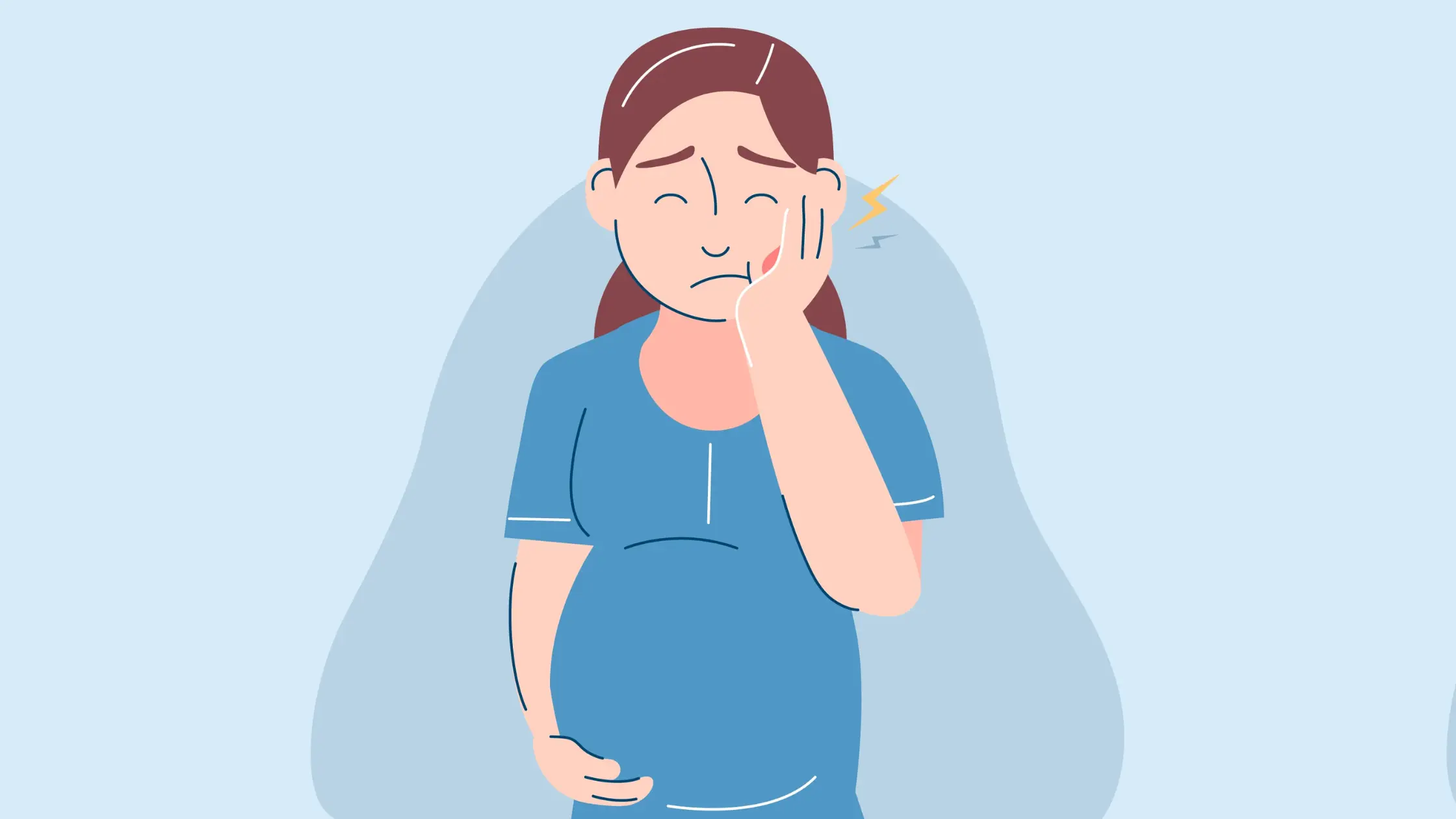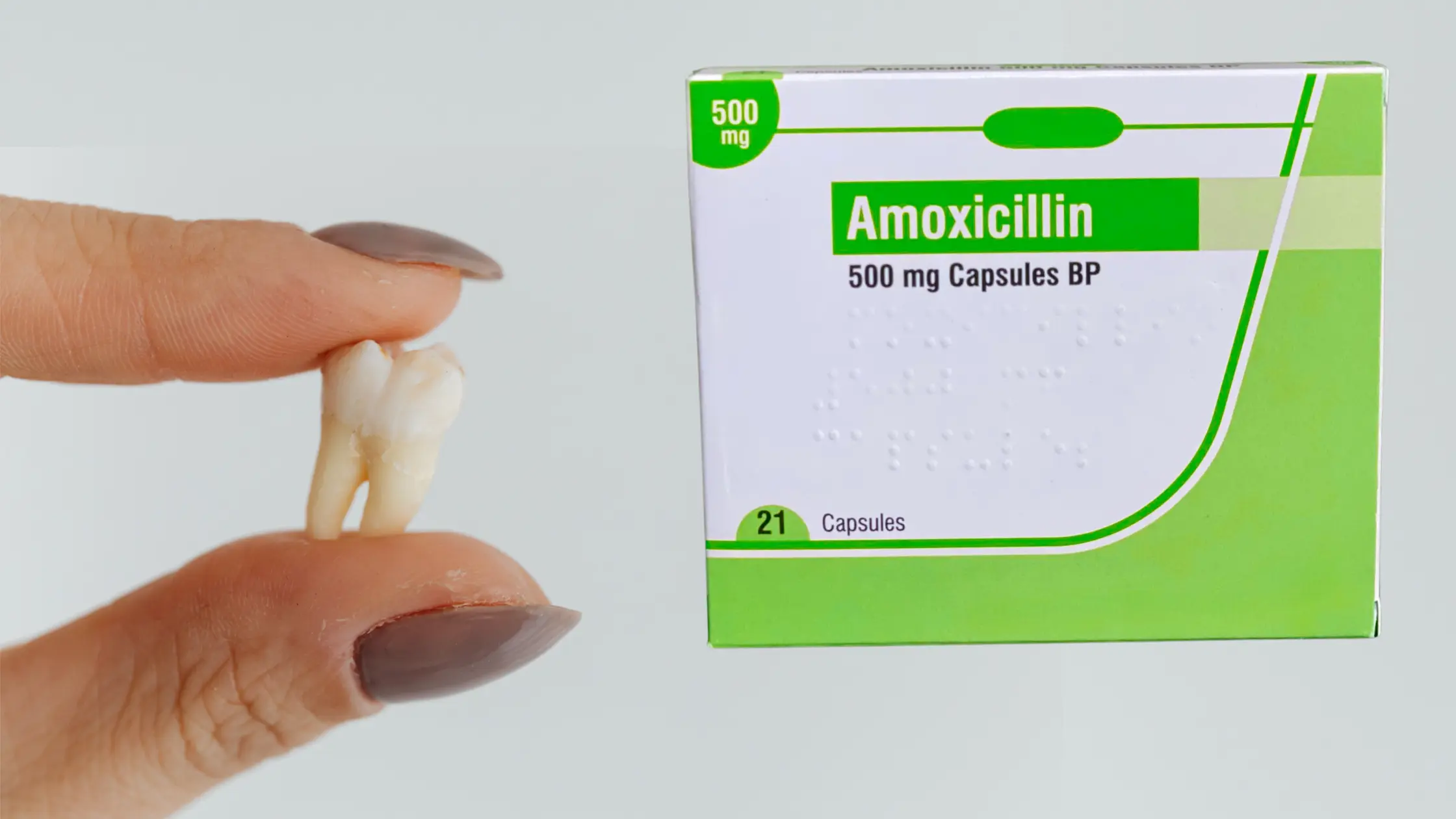Tooth infection may begin as a minor problem and grow to something more serious after failing to receive adequate treatment. This guide is specifically designed to help expectant mothers, parents of babies, and young children understand the tooth infection symptoms, chances of such an infection spreading to other parts of the body, and how to deal with such symptoms successfully. Tooth infections should be treated and detected early to help avoid complications.
Table of Contents
Understanding Common Tooth Infection Symptoms
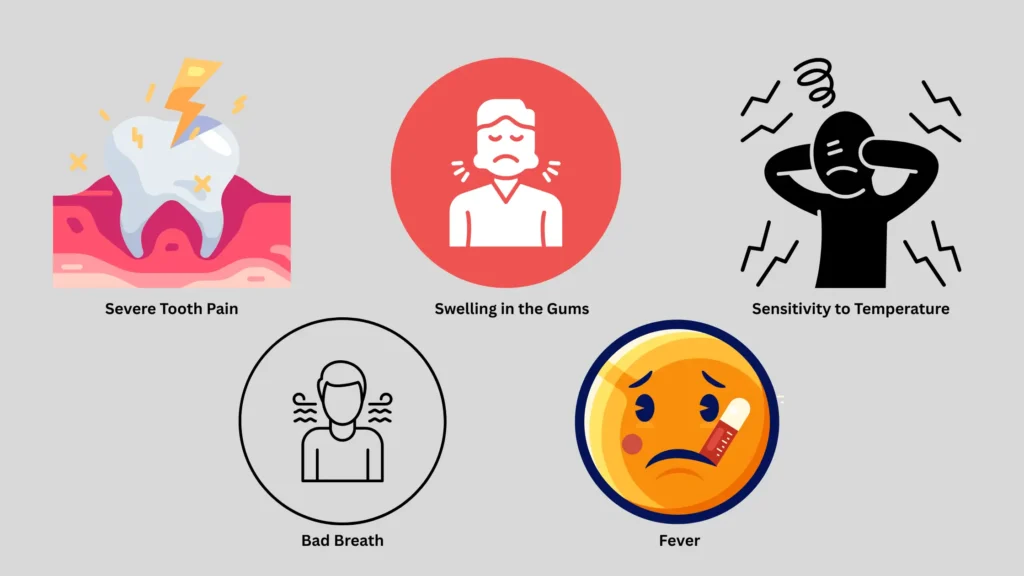
Infection in the teeth may also migrate to the nearby area, such as the mouth, jaws, and cheeks, if it is not treated. Bacteria usually cause these infections, and the severity of the symptoms increases with the length of time that the infection is left untreated. Read on to consider common symptoms:
1. Severe Tooth Pain
The most common of tooth infection symptoms is pain. The pain may start as a dull ache or become sharp and stabbing. Over time, the pain often worsens, especially when you chew, bite, or even touch the tooth. This is caused by the infection affecting the soft tissue inside the tooth (the pulp), causing inflammation and pus buildup.
- What it feels like: Persistent throbbing or sharp pain that worsens at night.
- What to do: While over-the-counter pain relief (acetaminophen) can temporarily alleviate the discomfort, a visit is essential for draining the infection and treating the underlying cause.
2. Swelling in the Gums
The one of another major tooth infection symptoms is swelled gums. The infected tooth often causes the surrounding gums to become swollen, red, and inflamed. The gums may be tender, and in some cases, you may notice a small pimple-like bump, which may drain pus. This drainage indicates that the body is trying to expel the infection.
- What it feels like: The gums around the infected tooth may feel soft and swollen, and you may notice a visible bump on the gums.
- What to do: Gargling warm saltwater may help reduce swelling, but it’s important to consult a dentist to drain the infection and prevent further complications.
3. Sensitivity to Temperature
When a tooth becomes infected, its nerves become more sensitive. This sensitivity is often to hot or cold foods and drinks. The sharp pain triggered by cold or hot items often occurs quickly and may be severe.
- What it feels like: A quick, sharp pain when consuming hot or cold foods.
- What to do: Avoid foods and beverages that are too hot or cold, and use lukewarm or room temperature items until your dentist addresses the issue.
4. Bad Breath (Halitosis)
As the infection progresses, bacteria inside the infected tooth begin to multiply and produce sulfur compounds, leading to a foul odor in the mouth. This is one of the most noticeable signs of an infection and can be especially bad if there is pus present.
- What it feels like: Persistent bad breath that doesn’t go away even after brushing.
- What to do: Regular oral hygiene can help manage bad breath temporarily, but only dental treatment will eliminate the root cause.
5. Fever
A fever is the body’s natural response to an infection. When a tooth infection spreads beyond the tooth, your immune system kicks in, and fever often follows. The fever may range from mild to moderate but should not be ignored, especially if it persists for more than a day.
- What it feels like: A general feeling of being unwell, combined with a body temperature of 100°F (37.7°C) or higher.
- What to do: Take fever-reducing medications like acetaminophen to manage the fever, but make sure to visit a dentist if it lasts more than 48 hours.
When a Tooth Infection Spreads: Identifying Serious Symptoms
If tooth infection symptoms are ignored and the infection is left untreated, it can spread to other parts of the body, causing more serious complications. For pregnant women, babies, and young children, prompt medical attention is essential to avoid life-threatening conditions.
1. Tooth Infection Spreads to the brain

In rare cases, an untreated tooth infection can spread to the brain, resulting in a condition called cerebral abscess. This is a serious, potentially life-threatening infection that requires immediate medical attention. Symptoms include:
- Severe Headache: A headache that starts out as mild but progressively worsens. This pain often becomes sharp or pulsating, typically felt in the forehead or around the eye area. The pain may intensify with movement, light, or sound, and can feel more severe when lying down or during physical activity.
- Confusion or Difficulty Thinking: As the infection spreads to the brain, it can impair cognitive functions, leading to confusion, disorientation, or memory issues. This can cause difficulty concentrating, answering questions, or performing normal tasks, and may also result in slurred speech or a general feeling of being “out of it.”
- Seizures: The infection may cause irregular electrical activity in the brain, leading to involuntary movements or loss of consciousness. Seizures can involve convulsions, twitching, or shaking, and may occur suddenly without warning, sometimes followed by confusion or memory loss.
- Nausea and Vomiting: This often accompanies severe headaches and may be a result of increased intracranial pressure caused by the infection. It can make it difficult to keep food or liquids down, and persistent vomiting may further contribute to dehydration and weakness.
What to do: If these symptoms occur, seek emergency medical care immediately. Despite being rare, this disease is serious and requires immediate medical attention to prevent brain damage or even death.
2. Tooth Infection Spreads to the eye

An infected upper tooth, especially one in close proximity to the sinuses, can spread to the eye. The infection may cause symptoms like:
- Eye Pain: Pain or a feeling of pressure in the eye socket that can be sharp or dull, often spreading from the upper jaw. The pain may worsen when moving the eyes, and can feel like a deep ache, sometimes radiating to the temples or forehead.
- Redness or Swelling Around the Eye: Redness or Swelling Around the Eye: The face around the eye area can swell, become inflamed and appear reddish in color indicating that the infection has progressed around the eye. Eyelids may also get heavy following such swelling and even making it difficult to open the eye fully.
- Vision Changes: When the infection penetrates into the inner structures of the eye, chances are that a person can start seeing foggy or even double vision. This may cause permanent harm without proper response, and in serious cases, may reflect on the peripheral vision, resulting in the formation of blind spots or loss of sight.
What to do: When you notice such symptoms turn to a medical professional as soon as possible because, otherwise, it can result in the loss of vision due to untreated infections.
3. Tooth Infection Spread to the Bloodstream (Sepsis)
A tooth infection entering the bloodstream and causing sepsis is one of the most severe complications since the condition can have a toxic effect on all organs of the body. The symptoms of sepsis are:
- Rapid Heartbeat: The body’s response to infection often involves a faster heart rate in an attempt to circulate blood and fight the bacteria. This can lead to palpitations, chest discomfort, and an overall feeling of unease, particularly when standing or during physical activity.
- Cold or Clammy Skin: As the infection worsens, the body may have trouble regulating temperature, causing cold, sweaty skin even if the person has a fever. The skin can feel damp and cool to the touch, and you may experience chills or shivering, even when covered in blankets.
- Low Blood Pressure: A significant drop in blood pressure can cause dizziness, fainting, or even shock, which is a critical condition that requires immediate medical attention. This can also result in confusion, weakness, and an inability to stand or sit up without feeling lightheaded.
What to do: Sepsis is a medical emergency and requires immediate treatment, often involving hospitalization and intravenous antibiotics. Seek medical attention immediately if symptoms occur.
4. Tooth Infection Spread to Sinuses
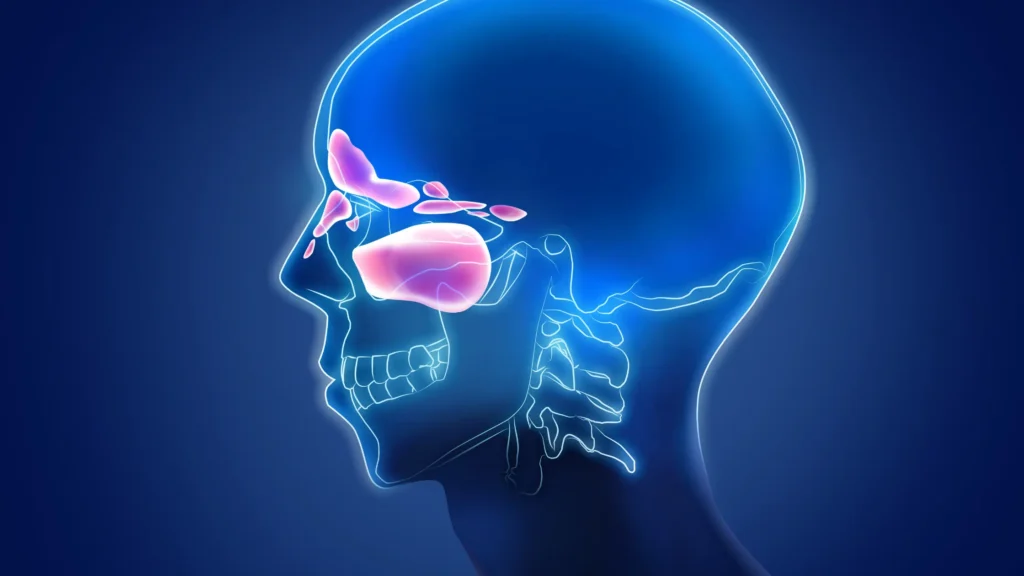
Sinuses can be infected with a tooth infection, especially one located in the upper teeth. Such a condition is called sinusitis and is characterized by:
- Facial Pain: Pain and pressure around the cheeks, forehead, and eyes as the sinuses become inflamed. The pain is often constant and can worsen when bending over, lying down, or when pressure is applied. It may also feel tender to touch and can spread to the upper teeth.
- Nasal Congestion: Difficulty breathing through the nose as the sinuses become blocked with pus or mucus. This congestion can cause discomfort, pressure in the face, and difficulty sleeping, especially at night. It may also lead to snoring or a sensation of fullness in the head.
- Yellow or Green Nasal Discharge: Thick mucus that may be discolored and foul-smelling, a hallmark sign of a bacterial infection. This discharge is typically more noticeable in the morning and may cause irritation in the throat, leading to coughing or a sore throat.
- What to do: Use saline nasal sprays or steam inhalation to clear the sinuses temporarily, but see a healthcare provider for antibiotics or other treatments if symptoms persist.
Managing Tooth Infection Symptoms for Pregnant Women, Babies, and Children
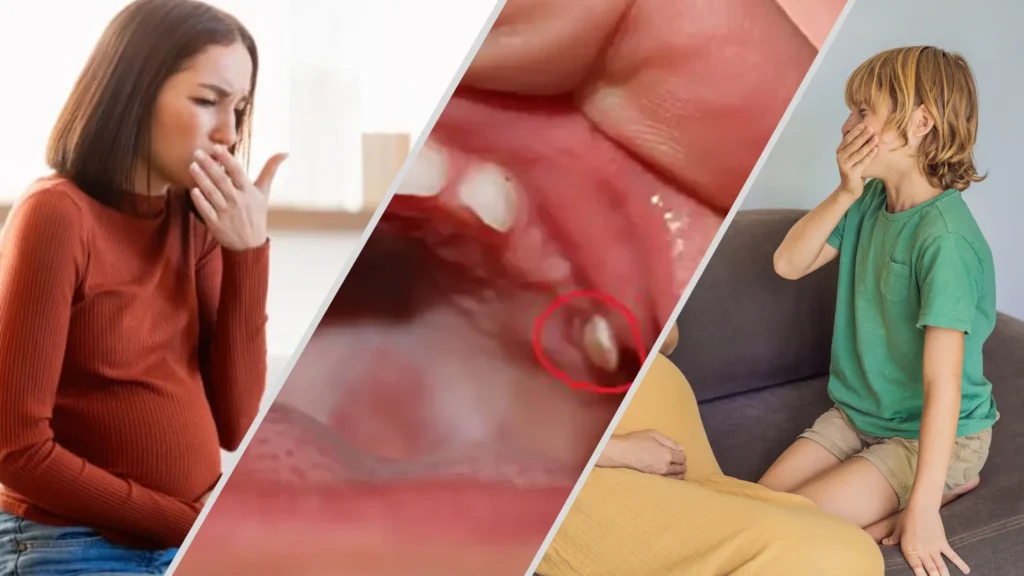
Pregnant women and young children can avoid complications by treating tooth infections early. The following are crucial actions to take in these delicate circumstances:
For Pregnant Women
- Consult a Dentist Immediately: Visit dentist immediately: Pregnant women have to see a dentist immediately they get symptoms of a tooth infection. You should discuss with your dentist and obstetrician and prioritize safety even though dental treatments during pregnancy are possible without risks.
- Avoid Over-the-Counter Painkillers: Pain medications like ibuprofen and aspirin are not recommended during pregnancy. Paracetamol (acetaminophen) is safer but should be used under medical guidance.
- Monitor Fever and Swelling: A fever that persists can signal that the infection is spreading. Pregnant women should be especially vigilant about symptoms of a spreading infection and seek care immediately.
For Babies and Children
- Monitor for Fever: If a baby or young child develops a fever and is showing signs of a tooth infection (like drooling, irritability, or difficulty eating), this could indicate a spreading infection.
- Comfort Measures: Cold teething rings or soft foods can help relieve discomfort in babies. For older children, ensure they are eating soft foods and drinking fluids to stay hydrated.
- Seek Medical Help: If the child develops a high fever, trouble swallowing, or pain that lasts more than a couple of days, consult a pediatrician or pediatric dentist for an assessment.
Frequently Asked Questions (FAQs)
Q1: How do I know if my tooth infection is serious?
- See a dentist or other healthcare professional right away if the pain gets worse, the swelling extends past the tooth, or you feel feverish, queasy, or lightheaded.
Q2: Can a tooth infection affect pregnancy?
- Indeed, a dental infection during pregnancy may result in an early birth or other issues. Both mother and child must receive treatment right away.
Q3: How can I prevent tooth infections?
- Brushing, flossing, and getting your teeth cleaned by a professional are all essential components of good oral hygiene. To prevent infections, treat gum disease and cavities as soon as possible.
Q4: What should I do if my baby has a tooth infection?
- To avoid complications, get your child pediatric dental care right away if they have a tooth infection. Keep an eye out for fever, swelling, or irritability.
Q5: Can a tooth infection spread quickly?
Indeed, if a tooth infection is not treated, it can swiftly spread to other areas of the body. In order to avoid serious complications, early treatment is essential.
Conclusion on Tooth Infection Symptoms
You can stop a tooth infection from spreading and leading to major health problems by identifying tooth infection symptoms early. This guide offers thorough information on the signs, dangers, and treatment options for tooth infections, whether you’re taking care of your own oral health or the oral health of a pregnant woman or child. To guarantee appropriate care and treatment, always seek advice from a healthcare professional.
Explore more on Pregnancy Must –
